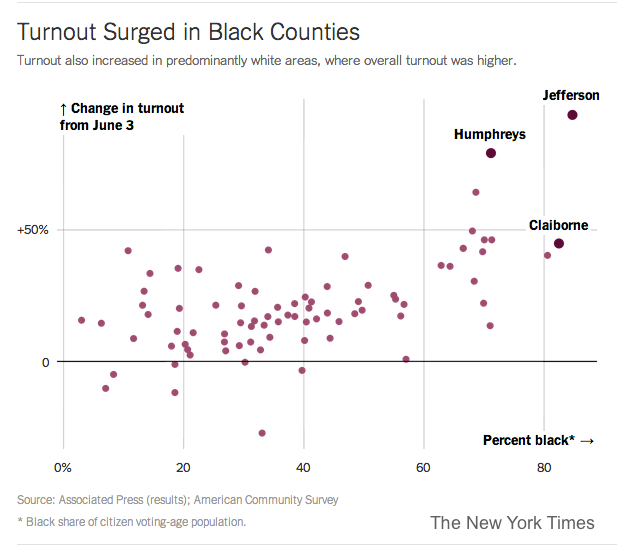Democrats just saved a GOP senator from the Tea Party. That's fair, and smart.
In a one-party state, it's not a dirty trick to vote for your next U.S. senator — it's democracy


A free daily email with the biggest news stories of the day – and the best features from TheWeek.com
You are now subscribed
Your newsletter sign-up was successful
Mark your calendar: On June 24, 2014, black Democratic voters pushed a white Republican U.S. senator to victory in the heart of the Deep South. That's the story out of Mississippi, where incumbent Sen. Thad Cochran (R-Miss.) narrowly defeated a Tea Party–backed challenger, state Sen. Chris McDaniel, 50.8 percent to 49.2 percent. McDaniel led in most pre-election polls and had nearly unseated Cochran in the first round of the GOP primary just three weeks earlier.
The story has the advantage of truth. In an election this close, any group could have made the critical difference. But early indications suggest that Democrats, especially in majority black districts, were the decisive factor. Turnout in the runoff was more than 14 percent higher than in the original primary — the first time that's happened in at least 30 years, Nate Cohn says at The New York Times — and it was up 92 percent in overwhelmingly African-American Jefferson County. Cohn provides this chart:

Courting primarily Democratic black voters was a conscious strategy by Cochran's campaign. It was also a pretty savvy move by the targeted Democrats to cross party lines and vote for the endangered incumbent.
The Week
Escape your echo chamber. Get the facts behind the news, plus analysis from multiple perspectives.

Sign up for The Week's Free Newsletters
From our morning news briefing to a weekly Good News Newsletter, get the best of The Week delivered directly to your inbox.
From our morning news briefing to a weekly Good News Newsletter, get the best of The Week delivered directly to your inbox.
There will be some griping among local Democrats that the Democratic candidate, former Rep. Travis Childers, would have had a better chance against the more polarizing McDaniel. And as Michael Tomasky notes at The Daily Beast, some national liberals were rooting for McDaniel to "put more crazy in the national GOP" and make the party "look that much more embarrassing." But the idea of Childers "winning a Senate seat in Mississippi was a pipe dream," Tomasky adds. And he's right.
If some liberals are disappointed with Cochran's victory, lots of conservatives are outraged. Chief among them is McDaniel, who used his non-concession speech Tuesday night to rail against "a Republican primary that's decided by liberal Democrats," hint darkly about "dozens of irregularities," and urge his backers to make sure "the sanctity of the vote is upheld." Although he lost the election, McDaniel added that "before this race ends, we have to be absolutely certain that the Republican primary was won by Republican voters."
As it turns out, in Mississippi, that doesn't have to be true: Under state election laws, Democrats had every legal right to vote in the GOP primary, as long as they didn't vote in the Democratic primary — and only 83,000 people voted in the Democratic primary, according to The Washington Post. There's nothing unfair, or even particularly untoward, about Democrats braving the Tea Party poll watchers to come out and save Cochran's bacon.
As to the wisdom of black Mississippians voting for a white Republican, let's start by noting — as Cochran has — that the state's senior U.S. senator is the ranking Republican on the Agriculture, Nutrition, and Forestry Committee and the vice chairman of one of the most powerful cliques in Washington: the Appropriation Committee's defense subcommittee. Democrats tend to (publicly) support a more active government, compared with Republicans, and Cochran brings home the goods. There's also this argument, from Jamelle Bouie:
A free daily email with the biggest news stories of the day – and the best features from TheWeek.com
A Thad Cochran who owes his next — and probably final — term to black support is a Thad Cochran who might work to secure their interests in the Senate. It's possible that Cochran could win with black voters and ignore them afterwards. But I doubt it. Politicians tend to respond to key constituencies, and black voters will be in a good spot if they can extract concessions from Cochran in return for their support, and he goes on to win. It's nakedly transactional, yes, but it's much better than trying to deal with an ideologue who draws his support from the most anti-government voters in the state. [Slate]
As for the ethics, in an essentially one-party state like Mississippi, the Republican nominee for statewide office is almost certain to win. So Democrats voting in the Republican primary aren't so much engaging in political hijinks as participating in representative democracy. The same could be said of Republican voters who cross over in solidly blue states, when legal. If Republicans in, say, New York want to have a say in who represents them in the U.S. Senate, they could do worse than voting for the more moderate candidate in the Democratic primary.
And that's perhaps the best, most momentous part of Cochran's victory — that is, unless you're a supporter of the Tea Party. If Democrats will cross over for a conservative Republican in Mississippi to thwart a Tea Party insurgent, that's one more tool that can used by the more moderate wing of the GOP to counter the Tea Party's biggest weapon, the threat of a primary challenge.
The polarization of U.S. politics has been widely documented, lamented, and criticized. Cochran and his black Democratic supporters just struck a blow for the broad middle of the American electorate. But don't take my word for it. Here's McDaniel, in his speech to supporters Tuesday night:
Today, the conservative movement took a backseat to liberal Democrats in the state of Mississippi. In the most conservative state in the Republic, this happened. And if it can happen here, it can happen anywhere. And that's why we will never stop fighting. [McDaniel]
McDaniel meant it as a warning. Self-appraised moderates can take it as a hopeful sign.
Peter has worked as a news and culture writer and editor at The Week since the site's launch in 2008. He covers politics, world affairs, religion and cultural currents. His journalism career began as a copy editor at a financial newswire and has included editorial positions at The New York Times Magazine, Facts on File, and Oregon State University.
-
 Political cartoons for February 12
Political cartoons for February 12Cartoons Thursday's political cartoons include a Pam Bondi performance, Ghislaine Maxwell on tour, and ICE detention facilities
-
 Arcadia: Tom Stoppard’s ‘masterpiece’ makes a ‘triumphant’ return
Arcadia: Tom Stoppard’s ‘masterpiece’ makes a ‘triumphant’ returnThe Week Recommends Carrie Cracknell’s revival at the Old Vic ‘grips like a thriller’
-
 My Father’s Shadow: a ‘magically nimble’ film
My Father’s Shadow: a ‘magically nimble’ filmThe Week Recommends Akinola Davies Jr’s touching and ‘tender’ tale of two brothers in 1990s Nigeria
-
 The billionaires’ wealth tax: a catastrophe for California?
The billionaires’ wealth tax: a catastrophe for California?Talking Point Peter Thiel and Larry Page preparing to change state residency
-
 Bari Weiss’ ‘60 Minutes’ scandal is about more than one report
Bari Weiss’ ‘60 Minutes’ scandal is about more than one reportIN THE SPOTLIGHT By blocking an approved segment on a controversial prison holding US deportees in El Salvador, the editor-in-chief of CBS News has become the main story
-
 Has Zohran Mamdani shown the Democrats how to win again?
Has Zohran Mamdani shown the Democrats how to win again?Today’s Big Question New York City mayoral election touted as victory for left-wing populists but moderate centrist wins elsewhere present more complex path for Democratic Party
-
 Millions turn out for anti-Trump ‘No Kings’ rallies
Millions turn out for anti-Trump ‘No Kings’ ralliesSpeed Read An estimated 7 million people participated, 2 million more than at the first ‘No Kings’ protest in June
-
 Ghislaine Maxwell: angling for a Trump pardon
Ghislaine Maxwell: angling for a Trump pardonTalking Point Convicted sex trafficker's testimony could shed new light on president's links to Jeffrey Epstein
-
 The last words and final moments of 40 presidents
The last words and final moments of 40 presidentsThe Explainer Some are eloquent quotes worthy of the holders of the highest office in the nation, and others... aren't
-
 The JFK files: the truth at last?
The JFK files: the truth at last?In The Spotlight More than 64,000 previously classified documents relating the 1963 assassination of John F. Kennedy have been released by the Trump administration
-
 'Seriously, not literally': how should the world take Donald Trump?
'Seriously, not literally': how should the world take Donald Trump?Today's big question White House rhetoric and reality look likely to become increasingly blurred
